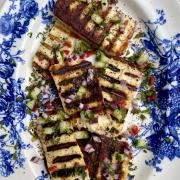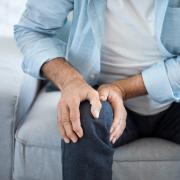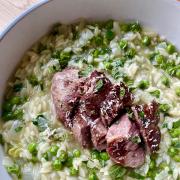You are what you eat, and nutritionist Annie Winter knows that better than most after changing her eating habits helped her through depression and grief. Now she helps others to live their best lives through food
We are what we eat. It’s one of those buzz phrases we’ve all heard that is absolutely true. The connection between food and our health has been scientifically proven.
Food not only fuels our bodies but impacts our physical and mental wellbeing. Although we may not feel it, our bodies replace billions of cells each day and the foods we consume provide the structure and functions for them. In the UK and world-wide, there has been an increase in obesity, chronic disease, diabetes and depression each year. A whopping 75% of chronic disease worldwide is caused by diet, nutrition and lifestyle factors. On the plus side, what we choose to put in our mouths is something we can easily change and many of us are turning to look at the day-to-day food choices we make and looking for guidance.
Annie Winter, a qualified BANT (British Association for Nutrition and Lifestyle Medicine) registered Nutritional Therapist, grew up in the New Forest and had a fascination with natural health and healing from a young age. Prior to her career in this field, she worked as both a musician and painter and decorator. Annie was a successful singer-songwriter, ran open mic nights and performed each year at Isle of Wight festival with her band. In 2017, her path took a different turn after she enrolled to study at the London College of Naturopathic Medicine.
She remembers: ‘Around six years ago, my partner and I moved to London. He was going back to study in higher education in music, so I decided to use this an opportunity to change my career path and study nutrition. I’d been writing and performing for a long time and just got a bit over it, there was a lot of pressure. So, I ended up following a passion of mine and studied nutrition in Kings Cross and worked in the city, in business support. That was a crazy time and ironically whilst studying nutrition, it was probably the most stressed and burnt out I’ve ever been.’
After losing her job in 2020, due to covid and cut-backs, Annie and her partner Ben, returned to the New Forest for what they thought was a temporary arrangement.

Annie said: ‘It was impossible to find another job during lockdown, everyone was working from home and Ben and I couldn’t afford our flat anymore. So, we decided to move out at the end of our tenancy and came back to the New Forest. We moved in with Ben’s Mum for what we thought would just be a couple of months, but we got comfy and ended up buying a house here. I got really into running along the sea wall and being around nature again. So set up my clinic and we ended up staying here in Lymington. I love having my base down here with all the nature. We’ve gone full circle – we’re back in the Forest; I’ve got a much better work-life balance and am feeling much happier again!’
Talking about how her interest in nutrition started, Annie shares: ‘Before I started studying nutrition, I noticed that the only time I was ever really ill was if something emotional was going on too. Bereavement or bad break ups always seemed to turn into something physical. My friend died when I was 15 in a car accident, it hit me really hard emotionally and it impaired my immune system; I got glandular fever for a whole summer.
She continues: ‘A while after that, I started suffering from IBS after a relationship ended. It wasn’t just mental but physical too. This is when I started to notice the connection. I went to the doctor and they recommended an elimination diet. My bowls were in spasm because of the nervous system being in overdrive – the gut and the brain is linked by nerves and chemicals. There are things you can do food-wise, like take things out that ferment to give your gut a rest and just eat beige foods for a while but at the same time, you need to address the problem which was the mental health side of it. I got into meditation and talking therapy because it became an anxiety. The connection between the gut and the brain is fascinating.’
Annie’s approach is to encourage balance, rather than strive for perfection and she says she practices what she preaches the majority of the time.
‘I like to aim for an 80-20 balance. I feed my body nourishing meals 80% of the time. Then for the other 20%, I like to relax a bit – have a glass of wine and a bit of junk. It is really important to not get obsessed with eating perfectly, instead on listening to your body and what it needs. Sometimes you just need a night off to indulge and that is totally ok. It is what we do most of the time that is important.’

Mostly, Annie’s clients come to her for ‘weight loss, diabetes or high blood pressure’ but also more recently, ‘gut related issues, arthritis and menopausal symptoms.’ Aside from her usual appointments, she also has a 12-week weight loss programme and offers wellness talks for businesses investing in their employees.
Annie notes her grandmother as her source of inspiration: ‘My Gran is 94 and just so physically and mentally resilient. She’s got this can-do attitude. She grew up in London during the war and would walk to school and see demolished buildings in the road. She refused to be evacuated as she didn’t want to leave her home. She’s really given me perspective but also whenever I’m doing something difficult and scary and I want the world to swallow me up, I just channel my Gran’s attitude and it really helps to push me forward.’
In the West, fad diets claiming to be a quick fix for obesity have grown in popularity. They come and go in a predictable cycle, often capitalising on the fear of certain foods. Annie shares her thoughts: ‘The most common is the demonization of carbohydrates. Lots of people think that they cause weight gain and diabetes which is just not true. Therefore, many follow diets such as restrictive fasting and keto diets because they think carbs are evil, but there is l little evidence for this. It is way more complex than that - it is about the type of carbs we eat that is important. Some think fruit is bad and should be limited – it does contain natural sugar but also fibre, water, vitamins and minerals and other plant chemicals that are highly beneficial.’
Annie’s top tip is to ‘eat more legumes and move daily! Beans and pulses are full of fibre, protein and are great for gut-health and weight loss, they help you to feel fuller for longer and are high in antioxidants. Also, moving daily is so important. It doesn’t even need to be high intensity; you don’t have to be smashing it in the gym for hours. Just move - doing something you enjoy, doing it regularly, it can have such a profound impact on mental and physical health.’

From helping clients to turn around a diabetes diagnosis to reducing inflammation in arthritic patients, Annie enjoys helping people to live their best lives as she says: ‘I just love meeting people and helping them on their journeys - it fuels my passion.’
When she’s not working, Annie is a keen gardener and has, ‘a mixture of a forest garden where we’ve planted trees and wild grasses and flowers that the bees like. It’s work in progress! I like growing edible things too and have a greenhouse. I like to do a little bit of foraging here and there.’
With the party season fast approaching, Annie encourages us to ‘not be too hard on ourselves. Rather than restricting yourself on what you can’t have, just try and get the good stuff in too. It’s inevitable we over consume a bit - I don’t want people to miss out and be miserable. If we are really restrictive, we tend to go the other way and binge. It’s all about moderation and just decide in advance what that means to you and stick to it. Try not to plan to much, we’re all guilty of trying to go to every social event. Sometimes we just need some downtime for ourselves!’ anniewinter.co.uk/



























